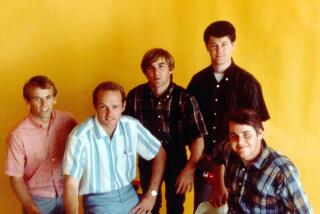Porgy and Bess and Barbara Ann
- Share via
In a surprise union of two quintessentially American composers from different eras, one the 1960s mastermind of “Good Vibrations,” the other the Jazz Age creator of “Rhapsody in Blue,” former Beach Boy Brian Wilson has been authorized by the estate of George Gershwin to complete unfinished songs Gershwin left behind when he died in 1937.
He plans to finish and record at least two such pieces on an album of Gershwin music he hopes to release next year.
The Gershwin-Wilson project may strike some as an odd coupling: one New York musician famous for sophisticated 1920s and ‘30s pop songs including “ ‘S Wonderful” and “Someone to Watch Over Me” as well as such expansive, classically minded compositions as “Rhapsody”; the other the driving force behind Southern California beach culture hits such as “Surfin’ U.S.A.,” “I Get Around” and “California Girls.”
But their career paths and evolution of their artistry have common threads, noted people involved with the project and some independent scholars, and that gives the proposed collaboration logic.
Todd Gershwin, George’s great-nephew and a trustee of the George Gershwin family trusts, said, “George for his time was a visionary. He certainly crossed genres and musical lines, tried things that hadn’t been done before and Brian Wilson has done exactly the same thing.”
For his part, Wilson, 67, described himself Tuesday as “thrilled to death.”
“I’m proud to be able to do it,” he said in an interview. “Hopefully I’ll be able to do them justice.”
Todd Gershwin said a collection of several dozen song fragments, ranging from “a few bars to some almost finished songs and everything in between” had been sitting virtually untouched for more than seven decades. He and other trustees began reaching out in the last year or two to find contemporary artists who might be interested in completing those musical bits and pieces.
Wilson, who says “Rhapsody in Blue” is his earliest musical memory, said the pieces he’s working with are very likely to remain as instrumentals, and that they could easily wind up as three-minute pop songs. But he’s also holding open the possibility of expanding them to more substantive pieces.
Wilson said many of them aren’t easy to evaluate.
“I can’t decipher the verse from the chorus from the bridge,” he said, “so I’m going to try to insert some new music into them. I might even write some music for an introduction.”
The Gershwin project grew out of a proposal to Wilson from Walt Disney Records for a two-album contract.
“I’m a massive Brian Wilson fan,” label president David Agnew said. “I’d always wanted to do something with him, and the Gershwin angle was something I had always thought about. In so many interviews he has mentioned Gershwin as a big influence, and if you listen to his music, that influence is obvious.”
Meanwhile, the Gershwin estate and Warner/Chappell Music, the Gershwin publisher, had been considering what to do with the many song fragments in their archive. A pianist working from manuscripts left by Gershwin recorded the music at the behest of the estate, according to Brad Rosenberger, senior vice president of catalog development and marketing for Warner/Chappell.
“When we did this, nobody had any idea that an artist like Brian Wilson was even thinking about doing something like this,” Rosenberger said.
Todd Gershwin said Wilson is the first to move ahead, but some uncompleted songs also may be used in a Gershwin tribute album that veteran engineer and producer Phil Ramone is putting together with a dozen artists for release in 2010.
Gershwin, who collaborated on most of his hit songs with his lyricist brother, Ira, stretched music of the day far beyond the compact pop song of Tin Pan Alley to more ambitious compositions incorporating elements of jazz and the classics, including “Rhapsody,” “An American in Paris” and the opera “Porgy and Bess.” He died of a brain tumor in Los Angeles at age 38 while working on a movie musical.
Wilson was one of the prime forces behind the expansion of pop music’s boundaries in the mid-’60s, taking the Beach Boys well beyond the frothy songs about surf, cars and girls. That culminated in the group’s 1966 album “Pet Sounds” and its planned follow-up, “Smile.” But “Smile” was shelved because of dissension within the band and lack of record company support, contributing to a psychological breakdown Wilson suffered in 1967. In 1999, he started on a career renaissance that led to the belated completion of “Smile” in 2004.
“ ‘Smile’ is ‘Rhapsody in Blue’ circa 2004,” Rosenberger said. “It’s very experimental, very rich and very melodic and really pushed popular music.”
Chris Sampson, associate dean of USC’s Thornton School of Music, said a Gershwin-Wilson collaboration is not as far-fetched as it may seem, despite the vastly different musical landscape of the two eras.
“Where they both made their mark was extending the form,” he said. “George Gershwin was the only composer of his time to make a mark with the popular style of the time and then successfully cross over to quote-unquote serious music by extending the form beyond the basic [pop song] structure, getting into operatic styles and things of that sort.
“Brian Wilson,” Sampson added, “redefined the pop song form . . . . through his orchestrations that took music in an entirely new direction. They’re coming from two very different musical styles to end up with what I presume will be something new. That’s the exciting interaction I see in this.”
Wilson joins some illustrious company in the scope of the Gershwin project. When Mozart died at age 35 in 1791, a consortium of his contemporaries worked to fill in the incomplete portions of his Requiem. J.R.R. Tolkien’s son commissioned writer Guy Gavriel Kay to complete the novel “The Silmarillion” that his father hadn’t finished when he died.
But even in such unusual cases it’s been exceedingly rare that the person finishing the uncompleted work has been as prominent as the artist who left the work behind.
For many of those involved with the project, the prospect of one day seeing songs credited to “George Gershwin-Brian Wilson” borders on the enticingly surreal. “For me personally,” Rosenberger said, “it’s a weird dream come true.”
--
More to Read
The biggest entertainment stories
Get our big stories about Hollywood, film, television, music, arts, culture and more right in your inbox as soon as they publish.
You may occasionally receive promotional content from the Los Angeles Times.










